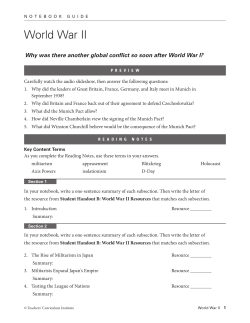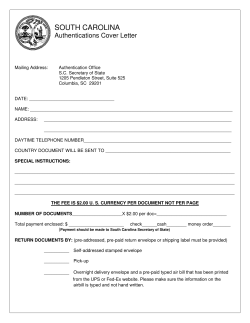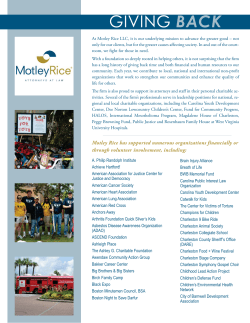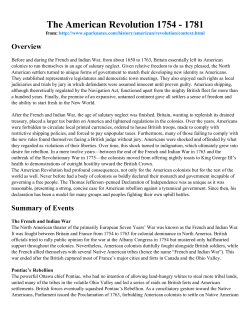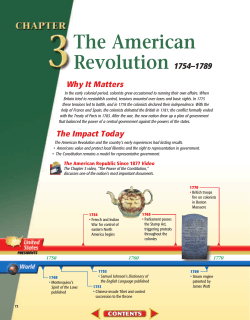
Document 39613
National Humanities Center Resource Toolbox Becoming American: The British Atlantic Colonies, 1690-1763 Library of Congress A New Map of North America, with the British, French, Spanish, Dutch & Danish dominions on that Great Continent . . . , London: 1750, detail “The continent is not wide enough for us both” * THE EUROPEAN COMPETITION FOR NORTH AMERICA The British & American Colonial Perspective: A Sampling, 1699-1763 “This continent is not wide enough for us both.” So pronounced a Boston clergyman as the fourth imperial war between Britain and 1 France in North America – the French and Indian War – began in 1754. The war would culminate in a total British victory and its acquisition in 1763 of French Canada and all French territory east of the Mississippi River (the land west of the Mississippi River 2 going to Spain.) Two centuries earlier the main competitors in the hemisphere had been Spain and France⎯for land in the Caribbean, not the North American continent. The stakes changed in the early 1600s when Britain became a contender by settling the mid Atlantic coast, right between Spanish Florida and French Canada. Thereafter the European powers, with their everchanging Indian alliances, strove to defeat each other and dominate the continent. Britain and France were the prime competitors, especially as their sights focused on the Ohio and Mississippi River valleys⎯land claimed and long settled by the Native Americans. As Britain emerged as the dominant imperial power of Europe in the 1700s, American colonists were more than pleased to share the bounty. “In the intertwined commercial and military successes, the British and their colonists found the measure of their virtues,” 3 writes historian Alan Taylor. “Enthusiastic participants in this patriotism of empire, the American colonists felt more strongly tied to the mother country.” This “patriotism of empire,” however, would be sorely tested as the colonies’ western claims were threatened by the “encroachments” of the French and Spanish with their Indian allies, and as Britain’s power over its colonies came to resemble that of an autocratic guardian rather than a “mother country.” The commentary presented here ⎯ including reports, essays, poems, maps, a narrative, and a sermon ⎯ samples the British and American perspective on the competition for territory and dominance in North America from 1699 to 1763. * National Humanities Center, 2009: nationalhumanitiescenter.org/pds/. Spelling and punctuation modernized by NHC for clarity. Permission pending from the American Antiquarian Society for texts accessed through the online digital collection Early American Imprints. Complete image credits at nationalhumanitiescenter.org/pds/becomingamer/imagecredits.htm. 1 The four imperial wars in North America, primarily between Britain and France, were: 1. King William's War, 1689-1697; ended in a treaty with no victor. 2. Queen Anne's War, 1702-1713, ended in an armistice. Britain gained some French Canadian territory. 3. King George's War, 1744-1748, ended in a treaty with no victor. 4. The French and Indian War (Seven Years' War), 1754-1763; ended with British victory and acquisition of Spanish Florida, French Canada, and all French territory east of the Mississippi River. 2 The exchange of territory in the late 1700s resembles a game of musical chairs. French Louisiana was ceded to Spain in a secret treaty in 1762, returned to France in another secret treaty in 1800, and then sold to the United States in 1803. Florida was ceded to Britain by Spain in 1763, returned to Spain after Britain’s defeat in the American Revolution, and then acquired by the United States in 1819 by treaty. 3 Alan S. Taylor, American Colonies: The Settling of North America (Viking/Penguin, 2001), p. 300. 1699 “the Inhabitants greatly alarmed” An English official visiting [South] Carolina warns Britain that the settlers might abandon the young colony if provided no protection from the French to their west. I find the Inhabitants greatly alarmed upon the news that the French continue their resolution to make a settling [near the] Mississippi River, from [where] they may come over land to the head of Ashley River without opposition; ’tis not yet known what care the Lords Proprietors intend to take for their preservation. Some ingenious gentlemen of this Province (not of the Council) have lately told me the Deputies have talked of making an Address to the Lords Proprietors for relief. But ’tis apparent that all the time of this French War, they never sent them one barrel of powder or a pound of lead to help them. They conclude they have no reason to depend upon them for assistance, and are resolved to forsake [abandon] this Country betimes [sometime] if they find the French are settled at Mississippi, or if, upon the death of the King of Spain, these Countries [colonies] fall into the hands of the French, as inevitably they will (if not timely prevented), and return with their families to England or some other place where they may find safety and protection. Edward Randolph, Surveyor-General of His Majesty’s Customs for North America, 4 Letter to the English Board of Trade and Plantations, 16 March 1699, excerpt. 1720 “quite turned to our disadvantage” Replying to questions from Britain, the governor of South Carolina reviews the colony’s deteriorating relations with the Indian nations, the Spanish to the south, and the French to the west. [See map, p. 3.] 3[RD] QUERY: What is the strength of the several nations of Indians in the neighborhood of Carolina and are their inclinations for us or for the French or Spaniards? [ANSWER]: By the within [enclosed] account of the number of Indians subject to the government of South Carolina in the year 1715, your lordships will find upwards of eight and twenty thousand souls of which there was nine thousand men, [who] traded for above £10,000 sterling yearly in cloth, guns, powder, bullets and ironware, and made return in buck skins, doe skins, furs and other peltry; and there was one way or other near 200 English Indian traders employed as factors by the merchants of Carolina amongst them. But in the said year 1715 most of them rose in rebellion and murdered the said traders and several of the planters and their families that lay most exposed to them. But before the end of the said year we recovered the Charokees and the northward Indians after several slaughters and blood sheddings, which has lessened their numbers and utterly extirpating some little tribes as the Congerees, Santees, Seawees, Pedees, Waxaws and some Corsaboys; so that war, pestilence, and civil war amongst themselves the Charokees may be computed reduced to about 10,000 souls and the northern Indians to 2,500 souls. At the same time, the fate of our southern and western Indians was quite turned to our disadvantage, for as soon as the Albamas had murdered our factor, the French immediately took possession of our place and built a fort by the name of Toulouse at the Albamous [Alabama River], thereby encroaching upon us and taking the trade of the Chickesaws, Albamas and a great part of the Tollaboosees, Abikaws, which will make near 6 to 7,000 souls. The Spaniards built a fort at Apalatchee and has taken the Apalatchees and the most desperate Creek Indians from us and the Yamasees removed to St. Augustine from whence they still continue their depredations. As for the Creeks they are situated now in 4 Narratives of Early Carolina, ed. Alexander S. Salley, Jr., (New York: Scribner’s, 1911), pp. 204-210; in series Original Narratives of Early American History, gen. ed., J. Franklin Jameson. National Humanities Center 2 the midway between us, the French, and the Spaniard, and deals with those that gives them most affecting a neutrality, yet making their advantages of the differences happening between the European nations so we may safely conclude that we have not above half of the trade and number of Indians subject to this government as we had 1715. . . . Library of Congress A New Map of North America, 1750, detail: southeast North America; claims outlined from British perspective (British/red; French/green, Spanish/yellow). Note the coastal towns of Charles Town (British), St. Augustine (Spanish), and New Orleans (French). 4TH. QUERY: What is the condition of the Spanish settlement at St. Augustine, what advantage might it be to the government of Carolina to have this place taken from the Spaniards annexed, and by what means this might be most easily accomplished? ANSWER: St. Augustine is the only town the Spaniards are possessed of in Florida and is situated in the latitude of 29 degrees and fifty five minutes north and about one hundred families of inhabitants, that make near one hundred more men, besides women and children whose chief support depends on the expense and pay of the soldiers. Out of this number they make a troop of about 40 horse and in and about the place in 4 or 5 villages they have 3 or 400 armed Indian men, most of which are Yamasees that lately committed the barbarous massacre on his Majesty’s subjects of Carolina and still continue (even during the peace with Spain by connivances of the Spaniards) their depredations and murders on the English. . . . The Spaniards at St. Augustine, having encouraged the Indians under their government to come and murder and plunder his Majesty’s subjects in Carolina, and themselves harbouring rebels, felons, debtors, servants, and Negro slaves, putting this government under a necessity of keeping a [military] force and some thousand pounds yearly charged to guard the frontiers, even in time of peace, there is an absolute necessity for us to expel them out of St. Augustine. We soon should reap the benefit of it by enlarging the trade of the colony by so many hands idle and maintained by the rest that could follow their work and a number more would flock into us who are deter’d by the dread this sculking war brings with it; and even our own Indians would be less insolent and more obedient to us who we are forced to court lest they should revolt. . . . 5TH. QUERY: How the French settlements on the River Mississippi may affect the people of Carolina; whether they have seized the fort of Pensacola belonging to the Spaniards; and what can be done to prevent any hazard or inconveniences Carolina may be exposed to from those settlements. ANSWER: Tis without dispute that the French are very strong there. By all accounts they are already not less than five or six thousand fighting men, and more are daily sent over from France with a design to make a very considerable settlement there. . . . National Humanities Center 3 These great preparations of settling the Mississippi cannot but very much alarm all the continents of America, and especially Carolina that lies so near them, for even in time of peace they underhand incense the Indians against us and encourage them to make inroads upon us to the great damage and hazard of our outmost settlements. But [if] there should ever be a war between the Crowns of France and England, this province would fall an easy prey to them, and very probably Virginia, New York and other plantations, to which this colony is a frontier, would feel the effects of the French growing so powerful in America. Gov. Robert Johnson, South Carolina, Responses to British queries, 12 January 1720, excerpts. 1726 “Westward the Course of Empire” 5 An Irish-English clergyman and philosopher (who lived briefly in Rhode Island) writes these lines on the ascendance of British America as the future “golden age” of civilization. The Muse, disgusted at an Age and Clime, Barren of every glorious Theme, In distant Lands now waits a better Time, Producing Subjects worthy Fame: There shall be sung another golden Age, The rise of Empire and of Arts, The Good and Great inspiring epic Rage, The wisest Heads and noblest Hearts. In happy Climes, where from the genial Sun And virgin Earth such Scenes ensue, The Force of Art by Nature seems outdone, And fancied Beauties by the true: Not such as Europe breeds in her decay; Such as she bred when fresh and young, When heavenly Flame did animate her Clay, By future Poets shall be sung. In happy Climes the Seat of Innocence, Where Nature guides and Virtue rules, Where Men shall not impose for Truth and Sense, The Pedantry of Courts and Schools: Westward the Course of Empire takes its Way; The four first Acts already past, A fifth shall close the Drama with the Day; Time’s noblest Offspring is the last Rev. George Berkeley, “Verses by the Author on the Prospect of Planting Arts and Learning in America,” written ca. 1726, published 1752. 6 1750 “they are for an offensive War” After the third imperial war in North America, a Massachusetts clergyman compares the French and British means of “managing a War.” What a great Difference there is between our managing a War, and our Enemies [managing a war]. The most we do is to defend ourselves at Home, but they are for an offensive War. . . It is observable to all who know the State of these Frontiers that there is not due Provision made to furnish Men our on any Occasion after the Enemy. There is neither Bread nor Meat, Shoes, Blankets, &c., that a Number of Men may take on any sudden Occasion. . . And so long as this is the Case, the Enemy never need fear our annoying of them when they have distressed us. . . . We may observe that in this War, as we increased our Number of Men in our Forts or Scouts, the Enemy have increased their Numbers; and the longer the War continued the oftener they came, and the more bold they grew. Which shows us what we must expect if the War breaks out a-new: Especially at this Time where there is no provision made for Men in our Frontiers. Rev. Benjamin Doolittle, A Short Narrative of Mischief Done by the French and Indian Enemy on the Western Frontiers of the 7 Province of the Massachusetts-Bay; From the Beginning of the French War . . . , 1750, excerpts. 5 Records in the British Public Records Office Relating to South Carolina (South Carolina Dept. of Archives and History, 1955) Vol. 7, pp. 233-250; reprinted in H. Roy Merrens, ed., The South Carolina Scene: Contemporary Views, 1697-1774 (University of South Carolina Press, 1977); permission pending. Indian nations printed as in Johnson’s reply; place names modernized for clarity by NHC. 6 David S. Shields, ed., American Poetry: The Seventeenth and Eighteenth Centuries (Library of America, 2007), p. 346; permission pending. 7 Early American Imprints, American Antiquarian Society; permission pending. National Humanities Center 4 1750 “the best Gems in his Crown” In commentary on a map of North America, an English mapmaker warns the King that Britain risks losing vast territorial claims on the continent to the “boundless ambition” of the French. Library of Congress Were there nothing at Stake between the Crown of Great Britain & France but the Lands on the Ohio, we may reckon it as great a Prize as has ever been contended for between two nations. For this Country is of that vast Extent Westward, as to exceed in good land all the European Dominions of Great Britain, France & Spain, and which are almost destitute of Inhabitants. It is impossible to conceive that had his Majesty been made acquainted with its Value & great Importance, the large Strides the French have been making for several Years past in their Incroachments on his Dominions, that his Majesty would Sacrifice one of the best Gems in his Crown to their Usurpation & boundless Ambition. A New Map of North America, with the British, French, Spanish, Dutch & Danish dominions on that Great Continent . . . , 8 printed for Robert Sayer, London, ca. 1750, details. 8 Courtesy of the Library of Congress, Geography and Map Division, Call No.G3300 1750 .S3 Vault; online at hdl.loc.gov/loc.gmd/g3300.np000059. National Humanities Center 5 1754 “And what a horrid scene is this” A Boston clergyman, in a sermon to the governor and assembly of Massachusetts, predicts a final and “violent concussion” of the British and French in North America. We are peaceably extending our settlements upon our own territories. They [the French] are extending theirs beyond their own, by force of arms. We must meet at length, which cannot be without a violent concussion, and the time seems not to be far off. . . The continent is not wide enough for us both; and they are resolved to have the whole. ⎯ The Court of Versailles [i.e., the French king], for extending the French dominions in America, hath ever adopted this maxim, Divide et Impera [divide and conquer], and, in pursuing it, hath stuck at no measures of perfidy or violence for rooting out their neighbours. And what horrid scene is this, which restless, roving fancy, or something of a higher nature, presents to me and so chills my blood! Do I behold these territories of freedom become the prey of arbitrary power? Do I see the motley armies of French and painted Savages taking our fortresses and erecting their own, even in our capital towns and cities! Do I behold them spreading desolation thro’ the land! Do I see the slaves of Lewis [i.e., King Louis XV of France] with their Indian allies dispossessing the free-born subjects of King GEORGE, of the inheritance received from their forefathers, and purchased by them at the expense of their ease, their treasure, their blood! Rev. Jonathan Mayhew, sermon, Boston, 29 May 1754, excerpts. 1754 “a great accession of power” 9 Benjamin Franklin, at the beginning of the French and Indian War, proposes two new settlements in the Ohio River Valley to “prevent the growth of the French power.” The great country back of the Appalachian mountains, on both sides the Ohio, and between that river and the lakes, is now well known both to the English and French to be one of the finest in North America, for the extreme richness and fertility of the land, the healthy temperature of the air, and mildness of the climate; the plenty of hunting, fishing, and fowling; the facility of trade with the Indians; and the vast convenience of inland navigation or water-carriage by the lakes and great rivers, many hundred of leagues around. From these natural advantages it must undoubtedly (perhaps in less than another century) become a populous and powerful dominion; and a great accession of power, either to England or France. The French are now making open encroachments on these territories in defiance of our known rights; and, if we longer delay to settle that country and suffer them to possess it, these inconveniences and mischiefs will probably follow: 1. Our People, being confined to the country between the sea and the mountains, cannot much more increase in number, people increasing in proportion to their room and means of subsistence. . . . 2. The French will increase much more, by that acquired room and plenty of subsistence, and become a great people behind us [to the west of us]. 3. Many of our debtors, and loose English people, our German servants, and slaves, will probably desert to them and increase their numbers and strength, to the lessening and weakening of ours. 4. They will cut us off from all commerce and alliance with the western Indians, to the great prejudice of Britain, by preventing the sale and consumption of its manufactures. 5. They will both in time of peace and war (as they have always done against New England) set the Indians on to harass our Frontiers, kill and scalp our people, and drive in the advanced settlers; and so, in preventing our obtaining more subsistence by cultivating of new lands, they discourage our marriages and keep our people from increasing, thus (if the expression may be allowed) killing thousands of our children before they are born. 9 Rev. Jonathan Mayhew, A Sermon Preach'd in the Audience of His Excellency William Shirley, Esq; Captain General, Governour and Commander in Chief, The Honourable His Majesty's Council, and the Honourable House of Representatives, of the Province of the Massachusetts-Bay, in NewEngland. May 29th 1754, 1754; accessed through Early American Imprints, American Antiquarian Society; permission pending. National Humanities Center 6 Library of Congress If two strong colonies of English were settled between the Ohio and Lake Erie, in the places hereafter to be mentioned, these advantages might be expected: 1. They would be a great security to the frontiers of our other colonies; by preventing the incursions of the French and French Indians of Canada on the back parts of Pennsylvania, Maryland, Virginia, and the Carolinas; and the frontiers of such new colonies would be much more easily defended than those of the colonies last mentioned now can be, as will appear hereafter. A New Map of North America, 1750, detail: Ohio River Valley and the Great Lakes 2. The dreaded junction of the (Lake Michigan labeled as “Ilinois L.”). Claims outlined from British perspective French settlements in Canada, (British/red; French/green). Note the Ohio and Mississippi Rivers and the two t French forts (French F . & Fr. Fort). with those of Louisiana would be prevented. 3. In case of a war, it would be easy from those new colonies to annoy Louisiana by going down the Ohio and Mississippi; and the southern part of Canada by sailing over the lakes; and thereby confine the French within narrower limits. 4. We should secure the friendship and trade of the Miamis or Twigtwees (a numerous people, consisting of many tribes, inhabiting the country between the west end of Lake Erie, and the south end of Lake Hurons, and the Ohio), who are at present dissatisfied with the French and fond of the English, and would gladly encourage and protect an infant English settlement in or near their country, as some of their chiefs have declared to the writer of this memoir. Further, by means of the lakes, the Ohio, and the Mississippi, our trade might be extended through a vast country among many numerous and distant nations, greatly to the benefit of Britain. 5. The settlement of all the intermediate lands between the present Frontiers of our colonies on one side, and the lakes and Mississippi on the other, would be facilitated and speedily executed to the great increase of Englishmen, English trade, and English power. ... The difficulty of settling the first English colonies in America at so great a distance from England must have been vastly greater than the settling these proposed new colonies, for it would be the interest and advantage of all the present colonies to support these new ones as they would cover their frontiers and prevent the growth of the French power behind or near their present settlements; and the new country is nearly at equal distance from all the old colonies and could easily be assisted from all of them. And as there are already in the old colonies many thousands of families that are ready to swarm, wanting more land, the richness and natural advantage of the Ohio country would draw most of them thither, were there but a tolerable prospect of a safe settlement. So that the new colonies would soon be full of people; and from the advantage of their situation, become much more terrible to the French settlements than those are now to us. The gaining of the back Indian trade from the French, by the navigation of the lakes, &c. would of itself greatly weaken our enemies: it being now their principal support, it seems highly probable that in time they must be subjected to the British crown or driven out of the country. National Humanities Center 7 Such settlements may better be made now than fifty years hence because it is easier to settle ourselves and thereby prevent the French settling there, as they seem now to intend, than to remove them when strongly settled. Benjamin Franklin, Plan for Settling Two Western Colonies in North America, with Reasons for the Plan, 1754, excerpts. 1755 “cheapest and strongest Barrier” 10 In a report to the British Board of Trade, a Carolina fur trader recommends adopting a centralized Indian policy similar to that of the French, who have “employed all their Art . . . to embroil us with the Indians.” The importance of Indians is now generally known and understood. A Doubt remains not that the prosperity of our Colonies will stand or fall with our Interest and favour among them. When they are our Friends, they are the Cheapest and strongest Barrier for the Protection of our Settlements; when Enemies, they are capable of ravaging in their methods of War, in spite of all we can do to render those Possessions almost useless. Of this the French are sensible, as well as of our Natural Advantages beyond their own, that they have employed all their Art, not only to embroil us with the Indians . . . but to destroy and utterly extirpate those Nations whose affections they could not gain by setting one against another, and themselves assisting to do it. The same reason should certainly make it our Policy to support and preserve them. Edmond Aitken, Report to the British Board of Trade, 1755, excerpts. 1755 “absolute subjection to the French Crown” 11 A merchant predicts dire consequences for Britain if it fails to oppose “further Encroachments of the French” in North America. The French Court seem always to have made North-America an Object of great Attention, and long ago to have formed a Plan which they have been steadily, tho’ slowly, carrying into Execution. Since the Treaty of Aix-la-Chapelle 12 they have been more hasty, well knowing of what Advantage it would be to their ambitious Views of universal Monarchy to accomplish it. Their Encroachments have been more numerous, their Hostilities more violent. . . . Clarke reviews the French construction of forts in Canada near the British colonies in New England and in the disputed territory along the Ohio River, and summarizes the French and Indian attacks on British settlers and militia troops. This Conduct of the French has deterred all the Traders of his Majesty’s Colonies from passing into the Indian Countries for the sake of Commerce, altho’ before these Hostilities of the French, three Hundred Traders went yearly from the single Colony of Pennsylvania. Besides these open Hostilities and Bare-faced Encroachments, the French are continually making use of every Art, Policy can suggest, with the greatest Industry human Nature is capable of, to seduce the Indians in Alliance with the English and draw them over to their Interest. For this Purpose, the most artful & zealous of their Missionaries are sent among them. The lower People are encouraged to live amongst and intermarry with the Natives. The Priests, after they are admitted amongst them, soon gain a great Ascendency over them. They make use of the Religion they teach them to inspire them with the greatest hatred to the English, and attachment to the French. In this they have had but too much Success, assisted as they have been by the bad Conduct of some of the English Governments to the Indians, of the most Consequence. . . . The French not only excite the Indians to Acts of Hostility but Reward them for it by buying the 10 11 12 First printed In Benjamin Vaughan, ed., Political, Miscellaneous, and Philosophical Pieces; . . . Written by Benj. Franklin, LL.D. and F.R.S., London: 1779, pp. 133-143 (also fragments of copy: American Philosophical Society); reprinted in The Papers of Benjamin Franklin, eds. Leonard W. Labaree et al. (Yale University Press, 1959–) #623327; permission pending. Wilbur R. Jacobs, ed., The Appalachian Indian Frontier: The Edmond Aitken Report and Plan of 1755 (University of Nebraska Press, 1967), pp. 7-8; permission pending. 1748, ending King George’s War (War of the Austrian Succession), 1740-1748, the third imperial war between Britain and France in North America. National Humanities Center 8 English Prisoners of them for the Ransom of each of which they afterwards demand the Price that is usually given for a Slave in these Colonies. They do this under the specious Pretense of rescuing the poor Prisoners from the Cruelties and barbarities of the Savages, but in Reality to encourage them to continue their Depredations, as they can by this Means get more by hunting the English than by hunting Wild Beasts; while in Reality the French, at the same Time, keep up a large Army of Indians entirely at the Expense of the English, without any to themselves. . . . The Six Nations [Iroquois] are the bravest Warriors of all the Indians. They have always been in Alliance with the English and had formerly the greatest Aversion to the French. They once not only threatened but had very near completed the Destruction [defeat] of Canada, but from the Neglect of the English to cultivate this Temper [attitude], and indeed from a direct contrary Conduct in some of the [colonies’] Governments, and from the Industry and Assiduity of the French to gain them to their Interest, many went off and settled amongst the French a long Time ago. A great Number are lately gone off; those that remain are very wavering in their Affections to the English, and there is not the least Doubt to be made but that they will entirely abandon us, and that in a very little Time, if they have not already agreed to do it, unless we behave with more Discretion and Justice towards them, & more Vigour and Resolution against the French. If this should be the Case, if these Indians should be gained to the French and the numerous Tribes in Alliance with them, all the rest of the Indians upon the whole Continent would infallibly be brought into the same Interest. What Use the French would make of these new Allies, we know too well from past Experience. They would most certainly employ them even in Time of profound Peace between the two Crowns, against any of all the British Settlements as would best suit their ambitious Views and Designs. . . . From [the Indians’] Numbers, their Situation, and the Rivers that run into the English Settlements, it is easy to conceive that they can at any Time make an Attack upon and constantly Annoy as many of the exposed English Settlements as they please . . . Clarke reviews the recent and potential attacks by French-supplied Indians on the western settlements of the British colonies. It is therefore highly necessary that the most vigorous measures should be speedily and unitedly projected and pursued to oppose any further Encroachments of the French, and to oblige them to relinquish those they have already made. The Safety and Security of all the English Colonies in North America, their very being as English Colonies, make such Measures absolutely necessary, and that without any Loss of Time. And how far the Interest of Great Britain itself may make such measures necessary will appear from considering the Importance of these Colonies to the Mother Kingdom. . . . That the Consequences of these Encroachments, if the French are suffered to keep Possession of them, and strengthen themselves in them, will be: 1. The engrossing the whole of the Fur Trade of North America to themselves. 2. The attaching all the Indians scattered thro’ that vast Continent upon the Back [i.e., west, backcountry] of all the English Settlements to their Interest. 3. The employing those Indians when thus attached to them, even in Time of profound Peace between the two Crowns [Britain and France], to annoy any of all his Majesty’s Colonies as may best serve their Purposes. 4. That they will one Day make themselves Masters of all the British Colonies in North America. That these Colonies are of such Consequence to the Trade, Wealth and Naval Power of Great Britain, and will in future Time make so much larger Additions to it, that whilst she keeps them entire, she will be able to maintain not only her Independency, but her Superiority as a Maritime Power. And on the other hand, should she once lose them and the French gain them, Great Britain herself must necessarily be reduced to an absolute Subjection to the French Crown, to be nothing more than a Province of France. William Clarke, Observations on the Late and Present Conduct of the French, with Regard to their 13 Encroachments upon the British Colonies in North America, written 1754, published 1755, excerpts. 13 Early American Imprints, American Antiquarian Society; permission pending. National Humanities Center 9 1755 “the whole is unjust and false” A British cartographer accuses France of “folly,” “bold depredations,” and acting as a “Christian pretender” in this map published during the French and Indian War. Library of Congress Virginia sidebar western Virginia New Scotland (Acadia/Nova Scotia) sidebar Henry Overton, A Map of the British Plantations on the Continent of North America . . . , London: between 1755 and 1760, details. 1760 “glorious success of his Majesty’s Arms” 14 In congratulatory remarks on the British victory in French Canada, the New York governor contrasts the combatants’ “different Disposition[s].” I am happy in congratulating you on the glorious Success of his Majesty’s Arms, under the Conduct of his Excellency General AMHERST, which has completed the Conquest of the whole Country of Canada. It does the highest Honour to the General’s Reputation that he has put a Period to an Enterprise of such Moment with so little Effusion of human Blood, and the Clemency with which he has on this 14 Courtesy of the Library of Congress, Geography and Map Division, Call No. G3300 1760 .O8 Vault; online at hdl.loc.gov/loc.gmd/g3300.ar008700. National Humanities Center 10 Occasion treated the Vanquished furnishes a striking Proof of the different Disposition of the two Nations. The French for many Years last, meditating the Ruin of these Colonies, have not scrupled to encourage in the Savages, their Allies, a Spirit of the most brutal Inhumanity. 15 No sooner has the English recovered an Influence over their Indians, than they made it their principal Care to restrain them from every Act of Cruelty, generously employing that Authority to the Preservation of the French, which is their hands had been used to such destructive Purposes towards the Subjects of the British Nation. Gov. Cadwallader Colden, Speech to the Council and General Assembly of New York, 22 October 1760, excerpt. 1762 “happy Fruits of a bloody War” 16 The publisher of a New England almanac for the year 1763 (publ. 1762) heralds the vast expanse of land west of the Appalachian Mountains now open to British settlement. As Providence has smiled upon the British Arms this War, we have Reason to hope that upon a Peace [treaty] Canada will be ceded to the English. 17 If that should be the Case, America will reap the happy Fruits of a bloody War. A vast extent of Territory will be added to the British Empire in America, and as long as Canada is held by the English, we shall have Peace with the Savages, so that that War, which at first seemed like to break up our new Settlements, will in the Conclusion greatly promote and increase the Settlement and Peopling of America. . . But now behold! the Farmer may have Land for nothing; Land that will produce all the necessaries of Life without Money and without Price ⎯ Land enough for himself and all his Sons, be they ever so many, . . . Nathaniel Ames, An Astronomical Diary: or, Almanack for the Year of Our Lord CHRIST, 1763, 1762, excerpts. 1764 “Supreme o’er all beneath the Skies” 18 In a New Year’s poem (1764), probably distributed by a newspaper carrier (“your Boy”), Britain’s final victory over France (Gaul) and Spain (Iberia) is celebrated. New Year’s Wish____A Happy Year to my generous Customers. I. Another memorable year is past, And Yesterday it shone its last, Britannia holds her glorious Race: Iberia yields her Rich Domains, And groans beneath Britannia’s Chains, So ’tis with France, dear Allies in disgrace. III. Thrice blest fair Britain! Nations bend, Suppliant that Britain be their Friend And learn to conquer but by thee, If haughty Spain unite with Gaul, Her madness urges her to Fall, Before the Thund’ring Sons of Liberty. II. Hark! whence this general Burst of Joy; See Britain’s Genius clasps the smiling Boy, Blest Cherub! Like thy Sire AUGUSTUS rise, And future Kings like him subdue Till Worlds shall learn their Fate from You, Supreme o’er all beneath the Skies. IV. Thrice blest are we, since Fate has sent War, from the Trembling Continent; Heaven grant You all domestic Joy, May every Blessing still increase And Britain awe the World to Peace, And Smiles and Pence the Portion of your Boy. Unsigned broadside, Boston, 1 January 1764. 19 15 I.e., the French, with no moral qualms, have encouraged their Indian allies to treat British prisoners with brutality. Early American Imprints, American Antiquarian Society; permission pending. 17 Canada was ceded to the British in the 1763 Treaty of Paris, ending the French and Indian War. 18 Early American Imprints, American Antiquarian Society; permission pending. 19 Ibid. 16 National Humanities Center 11
© Copyright 2025





